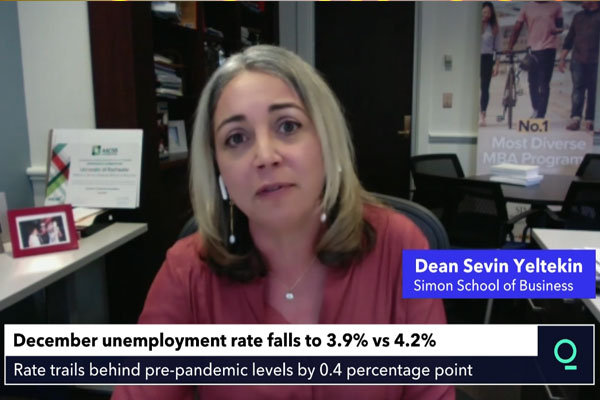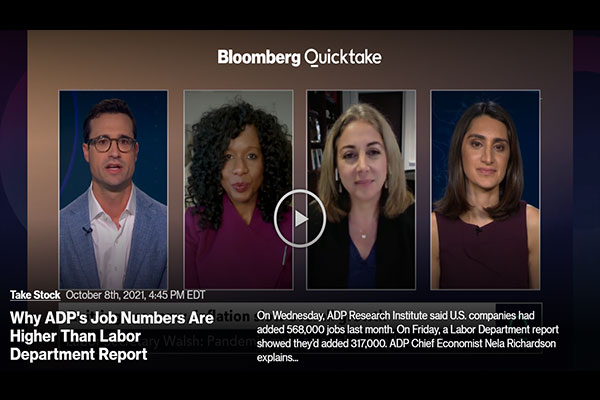Research that drives change.
Simon's Business & Policy Initiative.
The Business and Policy Initiative at Simon Business School fosters high-quality research about the interaction of public policy and business strategy.
Supported in part by The Bradley Center, the initiative is a hub for thought leadership on antitrust and merger policy, financial regulation, monetary and fiscal policy, health care policy, and labor market policy. The initiative seeks to inform public policy by promoting dialogue between researchers, policymakers, industry leaders, students, and alumni.
Jeanine Miklos-Thal, Director of the Business and Policy Initiative at Simon Business School, Introduces this new thought leadership initiative
AI, Competition, and Antitrust Workshop Webinar
Watch keynote speaker Professor Thibault Schrepel delve into the subjects of AI, competition, and antitrust issues.








Recent policy research by Simon faculty
Simon Business School is committed to elevating academic research. Our faculty are thought leaders and subject matter experts, producing research that to helps organizations better confront complicated business challenges.
The Journal of Financial Economics, the Journal of Accounting & Economics, and the Journal of Monetary Economics were all founded at the University of Rochester, and we continue to lead in research. Our renowned faculty have been published in a wide breadth of noteworthy publications, including The NY Times, The Register, Inside Higher Ed, the Journal of Financial Economics, The Economist, and many more.
- Antitrust and Competition Policy
- Miklos-Thal, Jeanine and Do, Jihwan: “Opportunism in Vertical Contracting: A Dynamic Perspective,” RAND Journal of Economics, forthcoming.
- Inderst, Roman, Griem, Fabian, and Shaffer, Greg (2025): “Bundling and Line Extensions in Distribution Channels,” Management Science, 71, 6184-6203.
- Miklos-Thal, Jeanine and Tucker, Catherine (2024): “AI, Algorithmic Pricing, and Collusion,” CPI: Antitrust Chronicle, February 2024, Vol. 2.
- Miklos-Thal, Jeanine and Do, Jihwan (2023): “Partial Secrecy in Vertical Contracting,” International Journal of Industrial Organization, 90, 102955.
- Kolay, Sreya and Shaffer, Greg (2022): “Slotting Fees and Price Discrimination in Retail Channels," Marketing Science, 41, 1145-1162.
- Miklos-Thal, Jeanine and Shaffer, Greg (2022): “The economics of dual pricing in vertical agreements,” Concurrences Review, 2-2022, 06194.
- Prager, Elena and Schmitt, Matt (2021): “Employer Consolidation and Wages: Evidence from Hospitals,” American Economic Review, 111(2), 397-427.
- Miklos-Thal, Jeanine and Shaffer, Greg (2021): “Pass-Through as an Economic Tool: On Exogenous Competition, Social Incidence, and Price Discrimination,” Journal of Political Economy, 129(1), 323-335.
- Miklos-Thal, Jeanine and Shaffer, Greg (2021): “Input Price Discrimination by Resale Market,” RAND Journal of Economics, 52(4), 727-757.
- Lu, S., Serfes, K., Wedig, G., and Wu, B. (2021): "Does competition improve service quality? The case of nursing homes where public and private payers coexist." Management Science, 67(12), 6493-6512.
- Ellickson, Paul, Grieco, Paul L.E., and Khvastunov, Oleksii (2020): “Measuring Competition in Spatial Retail,” RAND Journal of Economics, 51(1), 189-232.
- Ellickson, Paul, Arcidiacono, Peter, Mela, Carl, and Singleton, John (2020): “The Competitive Effects of Entry: Evidence from Supercenter Expansion,” American Economic Journal: Applied Economics, 12(3), 175-206.
- Health Care Policy
- Prager, Elena and Sinaiko, Anna (2024): “Tiered Network Health Plans and Changes in Physician Practice Intensity,” Health Services Research, 59(1):e14163.
- Prager, Elena, Vilsa Curto, Alexa Magyari, Marema Gaye, and Anna Sinaiko (2023): “Tiered Physician Network Plans and Patient Choices of Specialist Physicians,” JAMA Network Open, 6(11):e2341836.
- Brickley, J., Lu, S., and Wedig, G. (2022): “Are firms with 'deep pockets' more responsive to tort liability? Evidence from nursing homes” Health Economics, 31(8), 1590-1617.
- Prager, Elena and Schmitt, Matt (2021): “Employer Consolidation and Wages: Evidence from Hospitals” American Economic Review, 111(2): 397-427.
- Robitaille, Nicole, Mazar, Nina, Tsai, Claire, Haviv, Avery, and Hardy, Elizabeth (2021): "Increasing Organ Donor Registrations with Behavioral Interventions: A Large-Scale Field Experiment,". Journal of Marketing, 85(3).
- Brickley, J., Lu, S., and Wedig, G. (2021): “Five-star ratings and managerial turnover: Evidence from the nursing home industry,” The Journal of Law, Economics and Organization, 37(2), 278-313.
- Prager, Elena. (2020): “Healthcare Demand under Simple Prices: Evidence from Tiered Hospital Networks,” American Economic Journal: Applied Economics, 12(4): 196-223.
- Financial Regulation
- Kalmenovitz, Joseph, Vij, Siddharth, and Xiao, Kairong: “Closing the Revolving Door.” Journal of Finance, forthcoming.
- Kalmenovitz, Joseph and Vij, Siddharth: “Regulatory Risk Perception and Small Business Lending,” Management Science, forthcoming.
- Pandey, Vivek, Shen, X., and Wu, Joanna S. (2025): “Partisan regulatory actions: Evidence from the SEC,” Journal of Accounting and Economics, 101777.
- Harris, Milton, Opp, Christian C., and Opp, Marcus M., “Intermediary Capital and the Credit Market,” Management Science, 2025, 71(1), 162–183.
- Kalmenovitz, Joseph, Lowry, Michelle, and Volkova, Kate (2025): “Regulatory Fragmentation,” Journal of Finance, 80(2): 1081-1126.
- Goldstein, Itay, Kopytov, Alexandr, Shen, Lin, and Xiang, Haotian (2024): “Bank heterogeneity and financial stability,” Journal of Financial Economics, 162, 103934.
- Chen, Jason and Kalmenovitz, Joseph (2024): “Regulatory Similarity,” Journal of Law and Economics, 67(3), 691-730.
- Orlov Dmitry, Pavel Zryumov, and Andrzej Skrzypacz. (2023): “Design of Macro-prudential Stress Tests.” Review of Financial Studies, 36(11), 4460–4501.
- Glode, Vincent and Opp, Christian C. (2023): “Private Renegotiations and Government Interventions in Credit Chains,” Review of Financial Studies, 36(11), 4502–4545.
- Kalmenovitz, Joseph (2023). "Regulatory Intensity and Firm-Specific Exposure." Review of Financial Studies, 36(8), August 2023, Pages 3311-3347.
- Glode, Vincent, Opp, Christian C., and Sverchkov, Ruslan (2022): “To Pool or Not to Pool? Security Design in OTC Markets” Journal of Financial Economics, 145(2), 508-526.
- Kalmenovitz, Joseph. (2021): “Incentivizing Financial Regulators,” The Review of Financial Studies, 34(10), 4745-4784.
- Glode, Vincent and Opp, Christian C. (2020): “Over-the-Counter vs. Limit-Order Markets: The Role of Traders’ Expertise,” Review of Financial Studies, 33(2), 866–915.
- Macroeconomic Policy
- Kocherlakota, Narayana (2025): “Asymmetries in Federal Reserve Objectives,” Economic Policy 40, 371-400.
- Kocherlakota, Narayana (2024): “Difficulties in Testing for Capital Overaccumulation,” Quantitative Economics 15, 89-114.
- Kocherlakota, Narayana (2023): “Infinite Debt Rollover in Stochastic Economies,” Econometrica 91, 1629-1658.
- Kocherlakota, Narayana (2023): “Public Debt Bubbles in Heterogeneous Agent Models with Tail Risk,” International Economic Review 64, 491-509.
- Kocherlakota, Narayana (2022): “Stabilization with Fiscal Policy,” Journal of Monetary Economics 131, 1-14.
- Kocherlakota, Narayana (2022): "The Unavoidability of Low Inflation-Low Output Traps," Review of Economic Studies 89, 3410-3435.
- Haddad, Valentin, Alan Moreira, and Muir, Tyler (2021): "When selling becomes viral: Disruptions in debt markets in the COVID-19 crisis and the Fed’s response," The Review of Financial Studies, 34(11), 5309-5351.
- Kocherlakota, Narayana (2021): “Bounds on price-setting,” Theoretical Economics 16, 979-1015.
- Labor Market Policy
- Gray, Colin, Leive, Adam, Prager, Elena, Pukelis, Kelsey, and Zaki, Mary (2023): “Employed in a SNAP? The Impact of Work Requirements on Program Participation and Labor Supply,” American Economic Journal: Economic Policy, 15(1): 306-341.
- Forsythe, Eliza, Kahn, Lisa B., Lange, Fabian, and Wiczer, David (2022): “Where have all the workers gone? Recalls, retirements, and reallocation in the COVID recovery,” Labour Economics, 78.
- Prager, Elena and Schmitt, Matt (2021): “Employer Consolidation and Wages: Evidence from Hospitals,” American Economic Review, 111(2): 397-427.
- Clemens, Jeffrey, Lisa B. Kahn, and Meer, Jonathan (2021): “Dropouts Need Not Apply? The Minimum Wage and Skill Upgrading,” Journal of Labor Economics, 39(1), 107-149.
- Eliza Forsythe, Lisa B. Kahn, Fabian Lange, and David Wiczer (2020): "Labor demand in the time of COVID-19: Evidence from vacancy postings and UI claims," Journal of Public Economics, 189.
- Privacy and Data Policy
- Tan, Teck Yong: "Price Discrimination with Manipulable Observables," RAND Journal of Economics, forthcoming.
- Tan, Teck Yong: "Endogenous Outside Option and Data Privacy," RAND Journal of Economics, forthcoming.
- Miklos-Thal, Jeanine, Avi Goldfarb, Avery Haviv, and Catherine Tucker (2024): “Frontiers: Digital Hermits,” Marketing Science, 43(4), 697-923.
- Miklos, Andras and Jeanine Miklos-Thal (2024): “The Ethics of Online Steering,” Ethics and Information Technology, 26, article no. 24.
- Other Policy Areas
- Brecko, Kristina, Hartmann, Wesley. R. (2025). “Marketing and Economics of Harm Reduction: Evidence from Conservation Field Experiments.” Journal of Marketing Research, forthcoming.
- Kei Kawai, and Takeaki Sunada (2025): “Estimating Candidate Valence.” Econometrica, 93: 463-501.
- Barwick, Panle Jia, Shanjun Li, Andrew Waxman, Jing Wu, and Tianli Xia (2024). "Efficiency and Equity Impacts of Urban Transportation Policies with Equilibrium Sorting." American Economic Review 114 (10): 3161–3205.
- Primo, David M., and Jeffrey D. Milyo (2020): “Campaign Finance and American Democracy: What the Public Really Thinks and Why It Matters.” Chicago, IL: University of Chicago Press.
- STR 428 Strategy Beyond Market
We repeatedly observe top executives caught off-guard when faced with “nonmarket” threats such as proposed government regulations or activist pres- sure. But the concept of strategy beyond markets extends further than reactively responding to threats. Managers also have the opportunity to shape the nonmarket environment in ways that advantage their firm. In this course, we will develop a framework for constructing nonmarket strategies and integrating them with market strategies. We will cover a broad range of topics, including the legislative process, regulation, activism, corporate social responsibility, and crisis management. We will also study the special challenges facing global firms and innovative firms. Class sessions will be highly interactive and will emphasize the real-world applicability of the frame-works and theories we discuss in class.
- BPP 426 Macroeconomics
Macroeconomics is the study of how economies grow and fluctuate over time, and how they interact with one another. In this course, we discuss economic measurement, economic growth, and the business cycle. We also discuss the implication of modern theories of growth and fluctuation for the conduct of monetary policy and fiscal policy. There is a strong emphasis on the international linkage among economies and the implications of macroeconomics for the business environment.
- GBA 441 Business Ethics & Corporate Social Responsibilities
This course deals with business ethics and the social responsibility of business organizations. Through class discussions and case studies, students explore the theory and practice of business ethics and develop their ability to recognize and address ethical issues. The course equips students with analytical skills in ethical reasoning and provides them with a substantive framework to deal with ethical challenges they are likely to encounter in their careers. Topics include corporate responsibilities vis-à-vis employees, customers, and society; insider trading; discrimination in employment and in the sharing economy; advertising and sales tactics; ethics in pricing; bribery; executive pay; intellectual property in the pharmaceutical industry; censorship; health care resource allocation; and environmental responsibilities.
- BPP 432 Basic Business Law
This course surveys the law of contracts, agency, and business associations – with the objective of developing familiarity with selected laws, regulations, legal principles, and legal processes that govern (a) efficient exchange, generally; and (b) how and in what ways managers and entrepreneurs organize and interact to facilitate exchange. Although emphasis will be on United States law, there will be selected reference throughout the course to issues related to international transactions and to pertinent differences in legal systems of countries outside the United States. The course has a distinct transactional focus, with heavy reliance upon contemporary cases, commercial practices, and issues. Particular attention will be given to the impact of the legal framework upon sound managerial decision-making, business risk management, commercial rights and responsibilities, and ultimately business valuation.
- GBA 444 Ethics & Policy in Tech
Tech firms—from start-ups to industry leaders—face a range of ethical and policy challenges. Start-ups may face barriers to entry or regulations ill-suited to their innovation. Industry leaders have to consider antitrust considerations if they dominate a market. And tech firms of all sizes face ethical quandaries on issues such as artificial intelligence, to give just one example. The globalization of business adds to the complexity of these policy and ethical considerations. This course will equip you with the tools you need to consider the policy and ethical environments of tech firms and how they connect with firms’ market environments. The tools you develop in the course will also be applicable to the analysis of other types of firms. Class sessions will be highly interactive and will emphasize the real-world applicability of the frameworks and theories we discuss in class.
- Washington DC Fellowship
The Simon DC Fellowship is an annual award given to a Simon Business School student or team to pursue Washington, DC area-based research or a similar project that focuses on the intersection of government and business.
Past Business & Policy Events
- -
- -
- -
- -
- -


